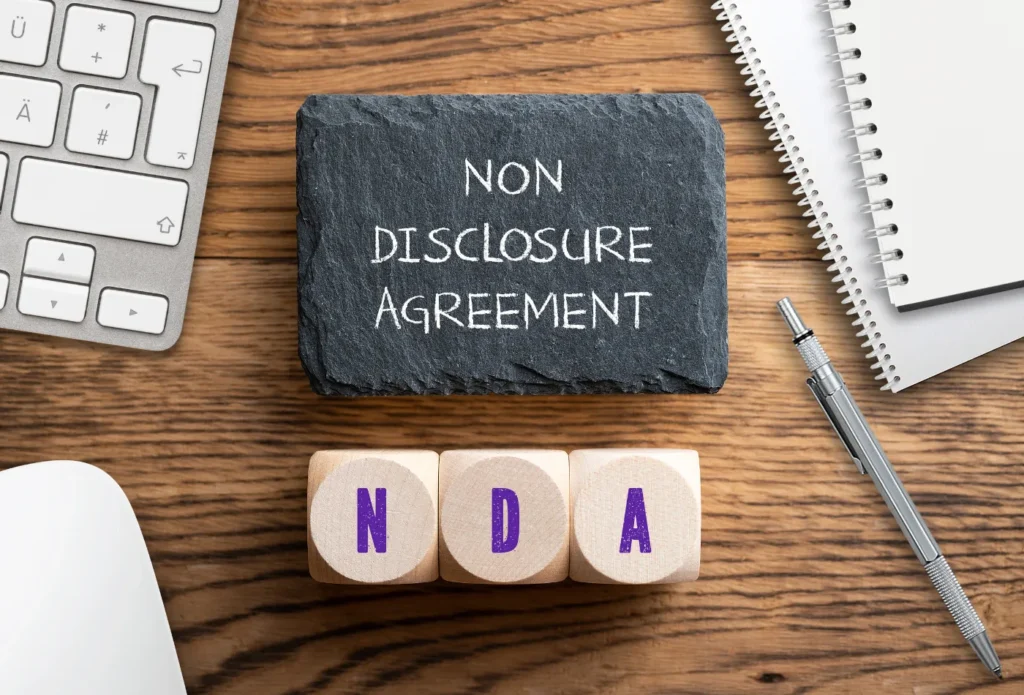The intricate world of business sales involves a delicate dance between disclosure and confidentiality. While potential buyers require access to sensitive information to make informed decisions, sellers naturally want to safeguard their competitive edge and protect proprietary data. This is where Non-Disclosure Agreements (NDAs) enter the scene, acting as legal safeguards to ensure a smooth and secure transaction process.
This comprehensive guide delves into the world of NDAs in business sales, empowering both buyers and sellers with the knowledge and best practices to navigate this crucial aspect of the deal.
Unveiling the NDA: Purpose and Function
1.1. The NDA Defined:
At its core, a Non-Disclosure Agreement (NDA), also known as a confidentiality agreement, is a legally binding contract between two or more parties. It establishes a framework for sharing confidential information with the understanding that its disclosure and use are restricted. In the context of business sales, NDAs play a vital role by protecting sensitive information revealed during the due diligence process, which is a critical phase where potential buyers meticulously examine the target business’s financial health, operations, and market position.
1.2. The Power of Confidentiality:
NDAs serve a multitude of purposes during business sales, safeguarding both the seller’s interests and fostering a productive negotiation environment:
- Protecting Confidential Information: Business operations often generate a wealth of valuable information, including financial records, customer databases, marketing strategies, intellectual property (IP), and trade secrets. NDAs act as a shield, preventing unauthorized access or misuse of this sensitive data by potential buyers.
- Maintaining Competitive Advantage: By restricting disclosure of confidential information, NDAs ensure that the seller’s competitive edge remains intact. This is especially crucial in situations where potential buyers might be direct competitors.
- Building Trust and Confidence: Establishing clear confidentiality boundaries through NDAs fosters trust and confidence between the seller and buyer. It demonstrates a commitment to responsible business conduct and protects both parties from the risk of sensitive information falling into the wrong hands.
Deconstructing the NDA: Key Components
A well-crafted NDA lays out a clear roadmap for handling confidential information during the business sale process. Here’s a breakdown of the essential components:
2.1. Defining the “Confidential Information”:
- The NDA should provide a clear and concise definition of what constitutes “confidential information.” This encompasses financial statements, customer lists, proprietary technology, marketing plans, intellectual property (patents, trademarks, copyrights), and any other information deemed valuable and exclusive to the business being sold.
2.2. Obligations of Parties:
- The NDA clearly outlines the responsibilities of both the disclosing party (seller) and the receiving party (buyer) regarding the handling of confidential information. This includes restrictions on disclosure (to whom and under what circumstances), use (for the sole purpose of evaluating the business sale), copying, reproduction, and transmission of the information.
2.3. Exceptions to Confidentiality:
- While NDAs aim for strict confidentiality, there may be situations where disclosure becomes unavoidable. The agreement should specify exceptions, such as disclosures mandated by law, court orders, or regulatory bodies. Limitations on disclosure to authorized personnel within the buyer’s organization may also be outlined.
2.4. Term and Duration:
- The NDA defines the timeframe for confidentiality obligations. This includes the effective date, when confidentiality obligations commence, and the termination date, when the obligations expire (typically upon completion of the transaction or after a specified period).
2.5. Remedies for Breach:
- The NDA should outline the consequences of violating its terms. This may include injunctive relief (court order to prevent further breaches), monetary damages to compensate for losses, or specific performance (requiring the breaching party to fulfill its obligations). Additionally, the agreement specifies the jurisdiction (court system) and governing law applicable to disputes arising from the NDA.
Choosing the Right Tool: Types of NDAs
Depending on the nature of the business sale, different types of NDAs can be employed:
3.1. Unilateral NDA:
- A one-way agreement where only the seller discloses confidential information. This is a common scenario when a seller shares sensitive business details with potential buyers during initial discussions.
3.2. Mutual NDA:
- A two-way agreement where both parties may disclose confidential information to each other. This type of NDA is frequently used in collaborative business ventures or joint ventures where confidential information exchange is a necessity.
Best Practices for Effective Use of NDAs
4.1. Customization is Key (Continued):
- It’s crucial to tailor the NDA to the specific circumstances of the business sale. Collaborate with legal counsel to ensure the agreement aligns with the unique needs of the transaction and complies with local laws and regulations.
4.2. Early Implementation, Maximum Protection:
- Don’t wait until negotiations are in full swing to implement the NDA. Execute the agreement at the beginning of the due diligence process to ensure confidential information is protected from the outset. This demonstrates a proactive approach to confidentiality and safeguards sensitive data from potential breaches.
4.3. Permitted Use: Clarity is Paramount:
- Clearly define the permissible uses of confidential information under the NDA. This might include evaluation purposes for the potential buyer or discussions with lenders or advisors directly involved in the transaction. Restrict unauthorized disclosure or replication of the information to prevent its misuse or dissemination beyond authorized personnel.
4.4. Regular Review and Updates:
- The business landscape and legal environment are subject to change. Periodically review and update NDAs to reflect any modifications in business circumstances, legal requirements, or technological advancements that might impact data security and confidentiality obligations.
Beyond the NDA: Additional Considerations
While NDAs are a cornerstone of secure business sales, there are additional factors to consider:
5.1. Data Security Measures:
- Beyond contractual agreements, implementing robust data security measures is crucial. This includes password protection, encryption of sensitive data, and access controls that restrict unauthorized access to confidential information.
5.2. Identifying Authorized Personnel:
- Clearly identify authorized personnel within the buyer’s organization who are permitted to access confidential information disclosed under the NDA. This helps mitigate the risk of inadvertent breaches by ensuring only those directly involved in the sales process have access to sensitive data.
5.3. Communication and Transparency:
- Open communication and transparency are essential throughout the business sale process. Both the seller and buyer should establish clear communication protocols for handling confidential information and addressing any concerns regarding data security or potential breaches.
Buy and Sell Online Businesses on Macbook Monster
Access expert support, insider tips, and powerful resources to help buyers and sellers succeed. Get the assistance you need today!
Conclusion: Fostering Trust and a Secure Transaction
Non-Disclosure Agreements (NDAs) play a vital role in facilitating smooth and secure business sales transactions. By understanding the purpose, key components, and best practices associated with NDAs, stakeholders can navigate the process with confidence. NDAs safeguard sensitive information, build trust between the seller and buyer, and ensure a competitive advantage is maintained.
Incorporating NDAs into your business sale strategy demonstrates a commitment to responsible business conduct and data security. By taking these steps, you can navigate the intricate world of business sales with greater peace of mind, fostering a secure and successful transaction for all parties involved.
Remember: NDAs are just one piece of the puzzle. Combining them with robust data security measures, clear communication, and a commitment to ethical business practices creates a solid foundation for a successful and secure business sale.







